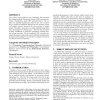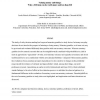524 search results - page 20 / 105 » Why phishing works |
ACMICEC
2008
ACM
13 years 10 months ago
2008
ACM
Prior theory and empirical work emphasize the enormous free-riding problem facing peer-to-peer (P2P) sharing networks. Nonetheless, many P2P networks thrive. We explore two possib...
CSCW
2008
ACM
13 years 10 months ago
2008
ACM
Google Maps and its spin-offs are highly successful, but they have a major limitation: users see only pictures of geographic data. These data are inaccessible except by limited ve...
MANSCI
2010
13 years 6 months ago
2010
The study of risky decision-making has long used monetary gambles to study choice, but many everyday decisions do not involve the prospect of winning or losing money. Monetary gam...
MST
2010
13 years 6 months ago
2010
Coloring a k-colorable graph using k colors (k ≥ 3) is a notoriously hard problem. Considering average case analysis allows for better results. In this work we consider the unif...
QUESTA
2010
13 years 6 months ago
2010
The M/G/K queueing system is one of the oldest model for multi-server systems, and has been the topic of performance papers for almost half a century. However, even now, only coar...


